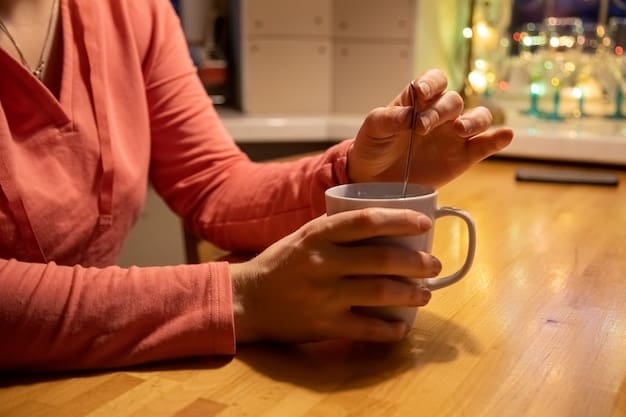In a world of constant notifications and relentless demands, finding a moment of peace can feel like a monumental task. For centuries, people across the globe have turned to a simple, warm cup of tea as a reliable ritual to unwind and de-stress. Beyond the comforting warmth and mindful practice of brewing, a growing body of scientific evidence confirms that certain teas contain powerful compounds that can biochemically soothe the nervous system, reduce anxiety, and promote a sense of calm. This article explores the seven most effective teas for managing stress and anxiety, explaining the science behind how they work and how to incorporate them into your wellness routine.
The Science of a Soothing Sip: How Tea Calms the Mind
The anxiety-reducing effect of tea is twofold. First, there is the psychological benefit of the ritual itself. The simple, mindful act of boiling water, steeping the leaves, and holding a warm mug can interrupt a cycle of stressful thoughts and ground you in the present moment. This practice encourages a pause, creating a buffer between you and your stressors.
Second, and more clinically significant, are the bioactive compounds within the tea leaves and herbs. These molecules can interact directly with your brain chemistry. Many of the most effective calming teas work by influencing the GABA system. GABA (gamma-aminobutyric acid) is the brain’s primary inhibitory neurotransmitter; its job is to slow down brain activity, leading to feelings of relaxation. By boosting GABA’s effectiveness, these teas can quiet an overactive mind.
Other compounds, like the amino acid L-theanine found in traditional teas, promote the generation of alpha brain waves, which are associated with a state of “wakeful relaxation.” These natural ingredients offer a gentle, non-habit-forming way to support your mental well-being from the inside out.
The 7 Best Teas for Anxiety and Stress
While many teas can be calming, these seven stand out for their specific, evidence-backed properties that target the physiological symptoms of anxiety and stress.
1. Chamomile Tea
Often hailed as the king of calming teas, chamomile is a gentle, floral herb that has been used as a traditional remedy for anxiety and insomnia for millennia. It is derived from the daisy-like flowers of the Asteraceae plant family.
The primary active compound in chamomile responsible for its relaxing effects is an antioxidant called apigenin. Research shows that apigenin binds to the same receptors in the brain that anti-anxiety drugs like benzodiazepines target. This interaction helps to increase the calming effects of the GABA neurotransmitter, promoting relaxation and inducing sleepiness.
A notable long-term study published in the journal Phytomedicine found that participants with generalized anxiety disorder (GAD) who took chamomile extract daily for an extended period experienced a significant reduction in their symptoms. With its mild, slightly sweet, and apple-like flavor, chamomile is an ideal choice for an evening ritual to help you wind down before bed.
2. Green Tea
While it may seem counterintuitive to recommend a caffeinated beverage for anxiety, green tea is a unique exception due to its high concentration of L-theanine. This powerful amino acid is known for its ability to promote relaxation without causing drowsiness.
L-theanine works by increasing levels of calming neurotransmitters like GABA, serotonin, and dopamine in the brain. At the same time, it reduces levels of excitatory chemicals linked to stress and anxiety. This synergistic effect with caffeine produces a state of calm alertness, making green tea excellent for improving focus and concentration during a stressful workday.
Studies have shown that L-theanine can directly influence brain activity, boosting the production of alpha brain waves. These brain waves are dominant during states of deep relaxation and meditation. If you are sensitive to caffeine, consider choosing decaffeinated green tea or Japanese varieties like Gyokuro, which is shade-grown to maximize its L-theanine content.
3. Lavender Tea
The soothing scent of lavender is widely recognized for its ability to calm the nerves, but drinking it as a tea may offer even more profound benefits. Lavender tea is made by brewing the fragrant purple buds of the Lavandula angustifolia plant.
The therapeutic effects of lavender are attributed to compounds like linalool and linalyl acetate. Both aromatherapy research and studies on oral consumption suggest these compounds can soothe the nervous system. Some evidence indicates that lavender works similarly to certain anti-anxiety medications by modulating the GABAergic system and calming the body’s fight-or-flight response.
A number of clinical trials using a standardized lavender oil preparation called Silexan have found it to be effective in reducing symptoms of GAD, restlessness, and sleep disturbances. The tea offers a floral, slightly pungent flavor and is a wonderful addition to a pre-sleep routine to calm a racing mind.
4. Lemon Balm Tea
A member of the mint family, lemon balm is a citrus-scented herb that has been prescribed by physicians for stress and anxiety since the Middle Ages. Its gentle, calming properties make it a favorite for those seeking to improve mood and reduce nervous tension.
Lemon balm contains compounds, including rosmarinic acid, that are believed to encourage the activity of GABA in the brain. By inhibiting an enzyme that breaks down GABA, lemon balm helps ensure more of this calming neurotransmitter is available to the brain, leading to a reduction in anxiety.
A 2014 study had participants consume a beverage with lemon balm extract and found that it significantly improved mood and cognitive performance, even during a high-stress multitasking test. With its light, refreshing lemon flavor, this tea is perfect for a midday break to reset your mind.
5. Peppermint Tea
While peppermint tea is not a sedative in the way chamomile or valerian are, it excels at alleviating the physical manifestations of stress. Stress often causes tension headaches, stomach knots, and muscle tightness, and peppermint’s active ingredient, menthol, is a natural muscle relaxant.
By relaxing the muscles of the stomach and intestines, peppermint tea can be highly effective at relieving stress-induced digestive issues like bloating and cramping. Its cooling properties can also help soothe tension headaches when they strike.
The invigorating aroma of peppermint has also been shown to improve mood and reduce feelings of frustration and fatigue. This makes peppermint tea an excellent choice for combating daytime stress without causing any drowsiness, helping you feel physically better and mentally refreshed.
6. Passionflower Tea
Passionflower, derived from the beautiful and intricate flowers of the Passiflora incarnata vine, is a potent herb traditionally used to treat anxiety and insomnia. It is often recommended for more significant feelings of restlessness and nervousness.
Like many other calming herbs, passionflower is thought to work by boosting levels of GABA in the brain, which helps to quiet overactive neural circuits. The effect can be quite powerful, and some studies have even compared its efficacy to that of prescription anti-anxiety medications.
One clinical trial found that passionflower was as effective as oxazepam (a benzodiazepine drug) in managing symptoms of GAD. Another study showed it significantly reduced anxiety in patients before they underwent surgery. With a mild, earthy taste, passionflower tea is best consumed in the evening or during periods of high anxiety.
7. Valerian Root Tea
Valerian root is one of the most well-known and potent herbal sedatives in the world, used for centuries as a powerful sleep aid and anxiety reliever. The tea is made from the root of the plant, which gives it a very strong, earthy aroma and flavor that some find unpleasant.
The exact mechanism of valerian is still being studied, but it is believed to contain compounds like valerenic acid that prevent the breakdown of GABA in the brain, resulting in a strong tranquilizing effect. This makes it particularly effective for stress that manifests as insomnia or severe restlessness.
Due to its potent sedative properties, valerian root tea is strictly a nighttime beverage. It should not be consumed before driving or operating machinery. While its taste can be an acquired one, many find its powerful calming effects on both mind and body to be well worth it.
Beyond the Mug: Incorporating Tea into a Wellness Routine
To maximize the benefits of these teas, it is important to treat the act of drinking them as a mindful practice. Step away from your screens, focus on the warmth of the mug, inhale the aromatic steam, and sip slowly. This dedicated pause is a form of self-care in itself.
Creating a consistent ritual, such as a cup of green tea in the morning or chamomile tea before bed, can signal to your body and mind that it’s time to relax or focus. While these teas are powerful tools, they are best used as part of a comprehensive approach to mental health that may include therapy, exercise, and a balanced diet. If you have severe anxiety, it is essential to consult with a healthcare professional.
Conclusion
From the L-theanine in green tea that sharpens focus while calming the mind to the apigenin in chamomile that lulls you to sleep, nature provides a rich apothecary for managing modern stress. The seven teas discussed offer scientifically supported compounds that can gently and effectively reduce feelings of anxiety. By embracing the simple ritual of brewing a cup, you can create a pocket of peace in your day, allowing both the warmth of the mug and the chemistry of the herbs to restore your sense of balance.












